There’s no denying that all the great love stories throughout history are also abound with great tragedy. In my lifetime I’ve yet to see another musical genre that had the power to inspire an entire revolution and attract as much love as the grunge movement did in the 1990’s, then only for it to suddenly “die” a few years later. At least there are too many arguments about the death of grunge music after Kurt Cobain tragically left the world in 1994.
However, as poetic as that sounds, there’s just too much evidence to the contrary. There’s a new generation of modern fuzz box rock acts that together have rejuvenated the genre and fused together elements of grunge, garage and a contemporary rock sound, and one of the most recent exciting additions comes from Berlin.
Messed!Up sat down with Tilman, Tore and Erik from fuzz box sounding PABST to talk about their debut album, the German grunge/garage scene and why they shouldn’t be taken for a Nirvana copy.
*****
Already since their debut EP “Skinwalker”, released in 2016, the band around frontman Erik Heise have been one of the most exciting newcomers on the German alternative scene. In 2017 they were nominated to Reeperbahn Festival’s ANCHOR awards for most promising emerging music talent and although it didn’t end up in the top position they got much attention from clubs around Germany thus getting booked for lots of live shows.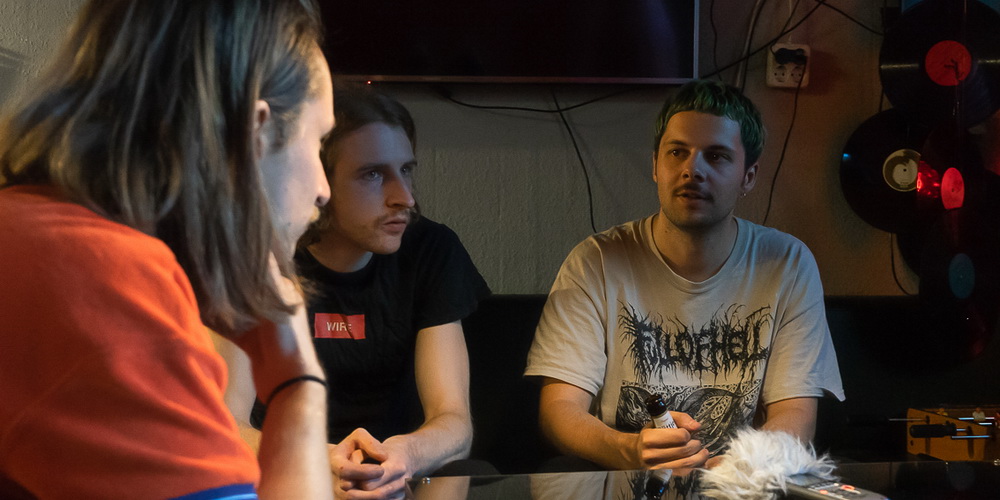
July this year saw the arrival of their debut album “Chlorine” and music journalists across Germany pointed out “noise”, “grunge”, “garage” and “riffs ascending to the skies” in their reviews of that distinctive, feedback-drenched, jagged, rock chaos among those twelve tracks on the album. And our talk starts in the debut album.
The never-ending comparison to Nirvana
You released your debut album “Chlorine” in June this year and it’s full of references to bands as Japandroids and especially Cable35, but also similarities to Nirvana according to many of the reviews I’ve read, and the record have received great reviews as well. Tell me about the feeling of finally having the album in your hands?
TILMAN: For me it’s the first album I ever released and album although I’ve been in several bands for ten years so this is pretty special to me. But I haven’t really realized it yet, it’s much to take in.
ERIK: It’s not that spectacular though. For me, the first time I saw it I thought “It’s finally getting somewhere”, but I guess I will realize that it was something special in the future when I’ll find the album in a box somewhere and think “Yeah, I recorded this album”, and remember the story behind it.
And now you have a full album to go on tour with. How different is it to have a full album to take on tour?
TILMAN: It’s actually a huge difference to tour an album rather than going around like some random band with just a few singles on Spotify. Sure, we’ve always had enough songs to be on the tour circuit but now people recognize us in a different way and even sing-along, that’s insane!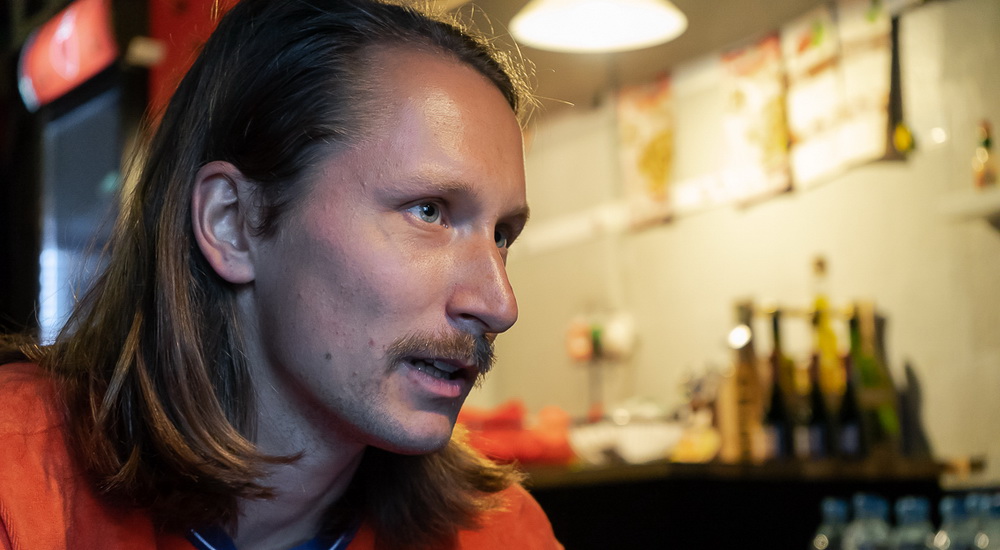
I know you started in 2016 and released the “Skinwalker” EP the same year but I don’t think non-German readers know that much about you. You have quite different entry points to PABST; you, Tore, contributed to the latest Thieves Like Us album which is something completely different from what you do in PABST. How did everything start out with PABST?
TORE: I’m primarily from the rock scene. Electronic music, like in Thieves Like Us, is just something I try to do (laugh). What we do in PABST is hardly anything new to me.
TILMAN: We played [with Tore] in another band that at one point was entirely electronic and we really didn’t fit in or knew how we could do what we actually wanted to do, and playing shows not sounding that massive as we wanted it to do was frustrating.
I really think you need to grow up with the music you want to do and we just said that the next record we’re doing will be done as a three-piece rock band; that’s how PABST came to be. PABST is basically a reaction to all of what we did before.
I’m quite sure that you often hear that your sound entails a lot of grunge influences although I think you have equally much garage rock in it. A magazine reviewing your debut album even calls you “Nirvana on a nasty acid trip”. What’s your take on that?
ERIK: Maybe the grunge thing in our music is the simplicity and that dirty, gritty sound in there. I recently watched a video which pretty much nailed it, where a guy was showcasing a Boss CS-1 distortion pedal which is one of the most sold dist pedals in the world – Kurt Cobain used it but also Steve Vai – and he said “This was used by one of the greatest guitar players in the world doing a lot crazy things with it and it was also used by Kurt Cobain who made it cool to write simple songs and play chords”. Maybe that’s what we take from grunge.
It’s cool to make simple songs and not show off (laugh), that’s what the band is about, not showing off.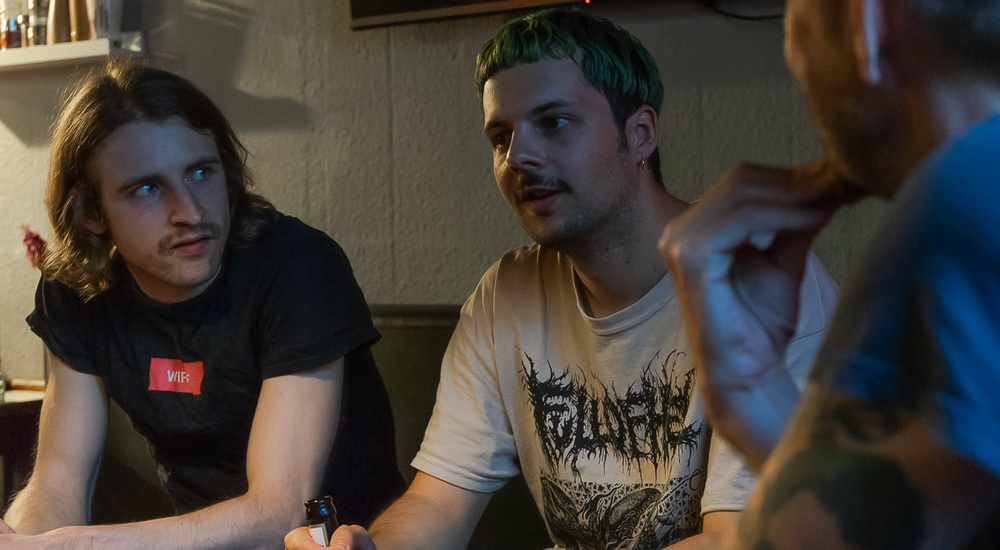
But you also made a great video to “Waterslide” and one of my colleagues said “Yeah, just another Nirvana impression”. What was the idea behind the video?
(Laughs)
TORE: For me it’s similar if you get compared to Joy Division when you play an eighth note bass. Why couldn’t you do a video with water and distorted guitars – because you get reminded about Nirvana and their well-known record cover? I guess there are other covers that will remind you about other bands, but sure, I get the point even though it’s not like that at all. We were kind of sure that this comparison would come up, but thought anyway “Why wouldn’t we do it?”.
ERIK: We knew that there would be someone seeing it like that and we actually called our manager to discuss “Should we really to this because people will compare it with the Nirvana cover” and he said “Let’s watch some Nirvana videos and see if they have any video filmed under water” and they don’t. It’s really just about the cover.
Our manager also know the guy who’s running the waterpark which made it quite much easier to use it as location for the video. But that’s basically the story there is to tell.
Many bands in Germany also refuse to sing in other languages but German and never reach out of Germany, to the UK or US for instance. How come that you picked up on English lyrics instead of walking down the German trail?
TILMAN: At this point it’s kind of a trend to sing in German again and it probably has to with the success of a few German bands inspiring other bands to do it as well. Of course, since it’s your native language you can probably express yourself in a different way. But for us, we grew up with music from the UK and the US and that inspired us to do it in the same way. It’s the most natural way for us to interact with music.
We probably even started playing The White Stripes or Nirvana the first time we picked up our guitars as well (laugh).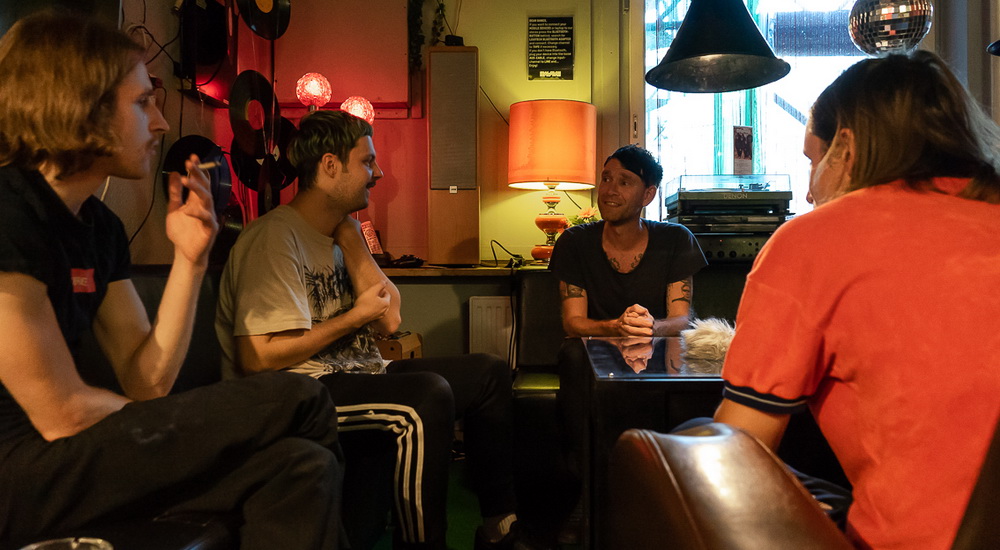
ERIK: Choosing your language is just like choosing the guitar sound. Of course it helps out much if you’re good in English. For me it can also be like wearing a mask or playing a role which helps me to be more direct than using German where you need to work up some courage to say certain things. I just see it like wearing a costume or be disguised in a way.
In my former band I was singing in German, and it’s not that I don’t like to do it but to this kind of music it fits much better to do it in English. It may sound like I’m acting but it’s rather that it allows me to do things in a more intense way, and say things that in your own language sound kind of weird because it’s too familiar.
Target set for reaching beyond Germany
Performing in front of hometown or home country crowds always make for a great night, but why limit yourself to just being a local hero? There’s an entire world out there, and there’s no reason you can’t be performing in front of international crowds. You may think you need a huge record deal and an international marketing team to make that happen, but in actuality, a plethora of indie artists have developed followings overseas all on their own.
With no language barrier PABST’s opportunities are not limited to Germany in their attempt to reach a following. Musically the American scene is even a better fit considering the popularity of grunge-induced garage rock and with its flannelsporting, garage-obsessed communities. 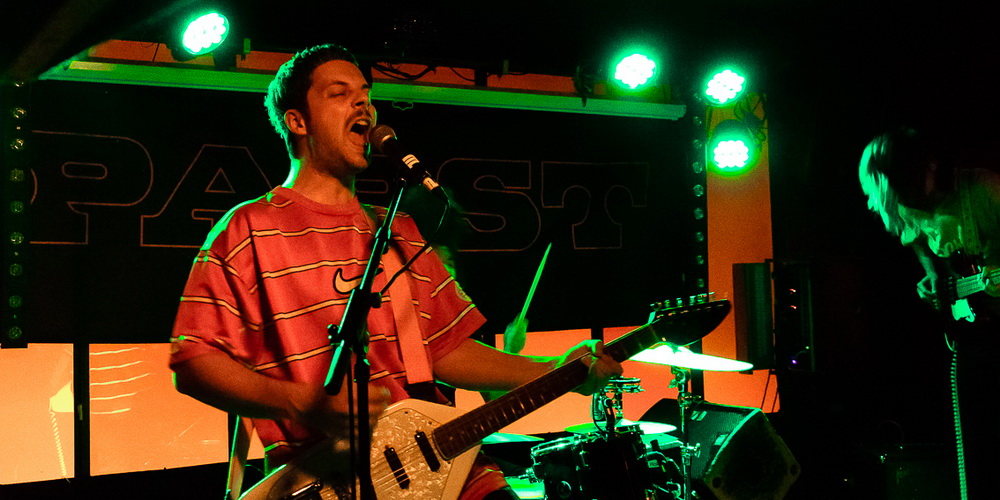
However, Germany needs to be conquered first and with the “Chlorine” tour and lots of upcoming shows during the fall, it might be just a matter of time before PABST will get a nationwide breakthrough.
From an outsider’s perspective the German music scene is mostly about electronic music and industrial rock and you’re sound is made for the British or American scene – they love their fuzz box bands. How good is the scene in Germany for bands as yours, in particular in Berlin which is kind of a center for electronic music?
TILMAN: There are quite many bands in the genre but they’re not as popular as the electronic bands or the big metal acts, but there is a scene with many bands in there across the country. There may not be a permanent center for garage rock or grunge in Germany – at the moment it’s probably Stuttgart – but you will find many small bands basically everywhere.
But how do you push yourself through all these new bands that make their debut every year? What’s your recipe for being visible among thousands of new bands?
ERIK: It’s luck, that’s all there is (laugh).
TORE: We really don’t have any plan or something like that and we really don’t know how to stick out.
ERIK: Maybe the key is that you shouldn’t try, just go with the flow and let’s see what happens; something will happen – or not.
TILMAN: There are even bands that have tried much harder than us and it hasn’t paid off anyway. When we started PABST it was more like “Let’s just do this”, write some songs and do an EP to put online. And it started slowly but gained some attention after a while, and since it’s getting better the longer we do this, we really don’t feel that we need to push this any harder than we do at the moment.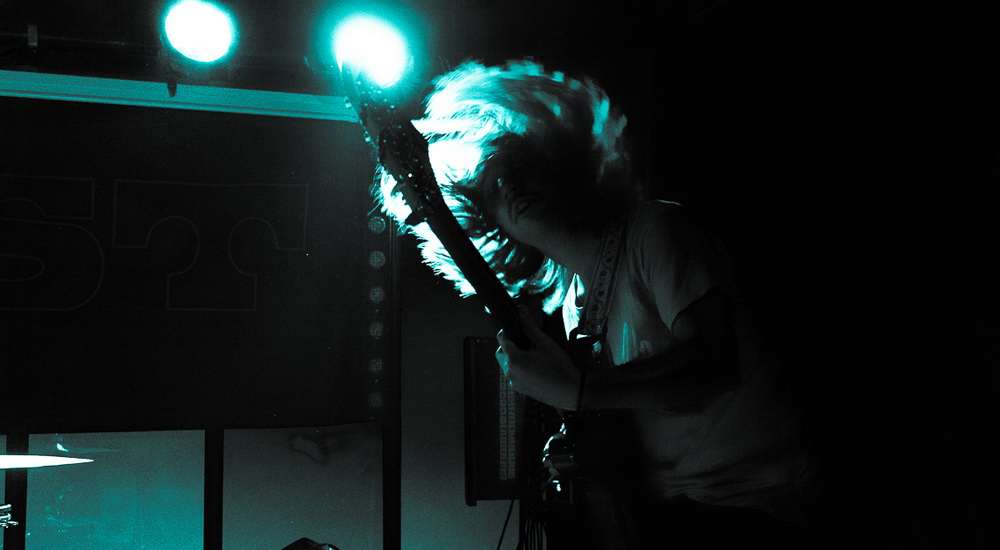
But didn’t you get much publicity by being nominated to the ANCHOR Awards at last year’s Reeperbahn Festival? Have you noticed any change after the awards?
TILMAN: Probably not that much more attention for us among people, but maybe we became more visible for clubs and booking agencies.
ERIK: We didn’t notice any major change at all, not like the winner, Jade Bird – she played US television and stuff like that. But it feels like much of the ongoing tour happens because those running the clubs saw us at Reeperbahn Festival last year; many of them may have seen us here at Molotow last year and thought “They were good, let’s try them out again”.
But we never noticed any immediate change at all actually although it must have had some effect.
I guess that your ambition is to get out of Germany and do shows abroad?
TILMAN: That would be a dream scenario for me. At the moment we’re on tour in Germany and have played a lot of festivals and it’s pretty much the same, which is nice of course, but I can’t imagine a band that would only play at home or that only tour Germany, Switzerland and Austria, and then that’s it. I would really love to play France, The Netherlands, UK or the US.
But is it difficult to get those gigs and break away from home turf, and play for instance in the UK?
TILMAN: Kind of, but it’s not our job to get us there, it’s the booking agents’ job but it helps out to play festivals like Reeperbahn Festival where people come from across the whole world to see new bands.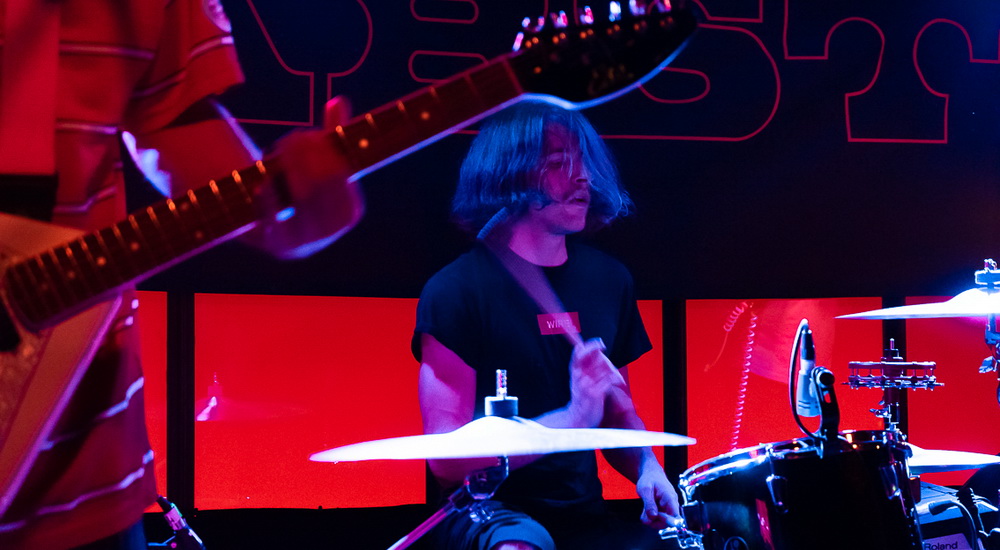
You started the ”Chlorine” tour last week, and did a few festivals during the summer and the tour ends soon except for a few one-off’s. What’s the ambition for the rest of 2018?
ERIK: The year doesn’t end yet (laugh). The rest of the year is pretty well-booked for us but we can’t tell you about it yet.
TORE: It’s not official yet but we’re going to support another band meaning that we’re booked for all weekends in October and November, and maybe a bit of December
How has the response been so far on the tour?
TILMAN: The best response is that the crowd interact with you, and you do remember those concerts which are like that and put more energy into them.
ERIK: We’re quite happy if people seem to like what we’re doing and give back some of the energy that we put into the music or on stage, and seeing someone sing along is the best feeling you can get, that’s crazy. Of course it would be more fun if everyone was singing along but for now, at this point, it’s enough if a few do it (laugh). That’s something you never thought would happen when you started.
TORE: But on this tour it has been insane and there are always a few guys knowing our songs on every show, and we haven’t existed as a band that long – the album was released just two months ago.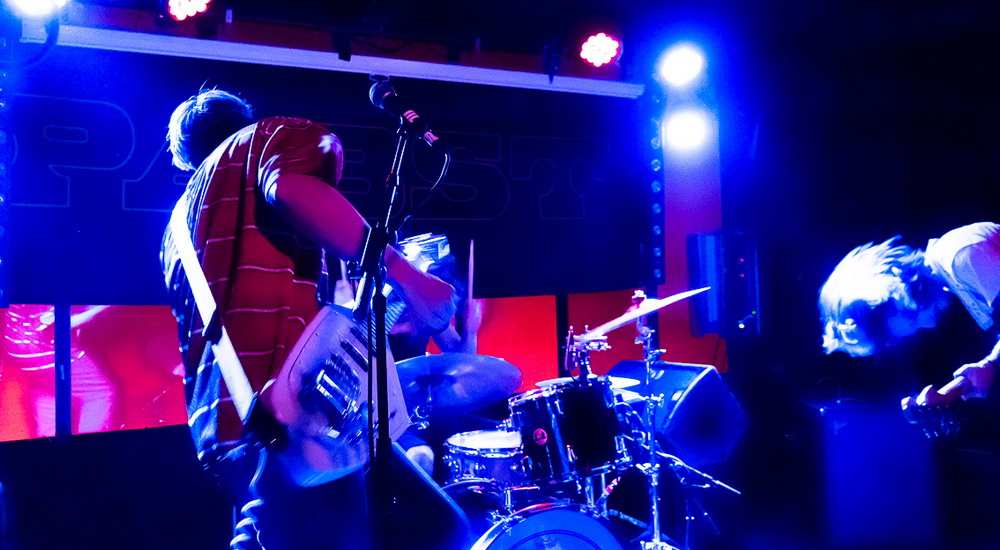
What’s the next step, in the near future?
TORE: For me it’s definitely another album and hopefully to get out of Germany and do some shows abroad.
ERIK: A small festival tour in the UK (laugh). But I think we all agree on that it’s quite much left to do for us; let’s do those things up until then.
Photographer interview: ©Jule Rog
Photo gallery
PABST pages
Messed!Up recommends
 Messed!Up
Messed!Up